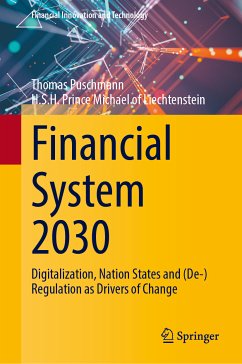This book is based on the results of a series of ten roundtables with high-level experts on the future of the financial system. Experts from academia, supranational institutions, central banks, commercial banks, regulators, start-ups, technology companies, venture capital firms, think tanks, foundations, and other visionaries from five continents developed potential scenarios of the financial system 2030 over a time horizon of five years. The book presents the results of these discussions, which are structured along the 'Vaduz Architecture'. This newly introduced concept distinguishes different dimensions for the future financial system, including information technologies, nation states and (de-) regulation.
Dieser Download kann aus rechtlichen Gründen nur mit Rechnungsadresse in A, B, BG, CY, CZ, D, DK, EW, E, FIN, F, GR, HR, H, IRL, I, LT, L, LR, M, NL, PL, P, R, S, SLO, SK ausgeliefert werden.









